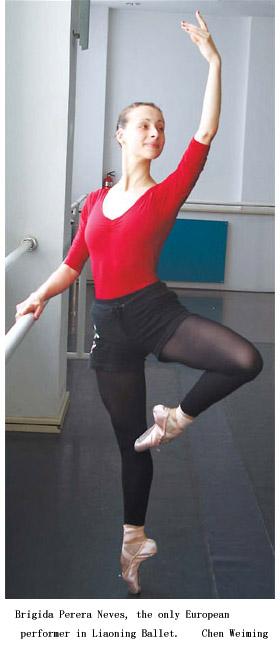
Unpredictability seems to be the defining word in Brigida Perera Neves' life. She had always been intrigued by China but never really thought she would be living in this many-splendored country one day.
She arrived in London from Portugal at age 16 to train at the city's Rambert School of Ballet and Contemporary Dance, and has been pirouetting across half the world ever since.
Working as an independent ballet dancer, she found, was fun once she was done with her schooling. She got decent breaks, including one with the English National Ballet in London.
The budding ballerina went twirling on her toes all over Europe and America, touring with performance groups - until one day a small notice inviting dancers to audition for a ballet company in Suzhou, Jiangsu province, caught her eye.
Neves was ecstatic when she got the job. "I was going to experience a culture very different from Europe and a new dance language."
It was only after she arrived in Suzhou that she found she had landed in a pretty kettle of fish. "I had auditioned for a solo part as a ballerina but what these people had in mind was something on the lines of a cabaret."
Within a week she was out of Suzhou, jobless and homeless. She drifted for a while, doing stints in Hong Kong, Shanghai and Guangzhou, sometimes holding down two jobs at a time, teaching both English and ballet.
It was six months before she landed a contract as a soloist with Liaoning Ballet, and came to work with the company in Shenyang, as the lone European performer in an all-Chinese cast of dancers. Soon after, her graphic-designer boyfriend, who has Filipino, Spanish, Chinese and English roots, followed her to Shenyang.
It has been quite a journey ever since. From the solo number and performances in compositions based on Chinese themes - her Liaoning Ballet debut - to playing one of the dancers in a pas de quatre in the opening sequence in Swan Lake, now showing in Japan, Neves has hardly had a moment to breathe.
"I am very happy in both artistic and personal terms. It has been very enriching indeed," she says.
Between the Christmas of 2007 and now, Neves has performed at the Olympic opening at Qingdao, been on Liaoning TV and performed to full houses in Beijing's National Center for the Performing Arts.

She says there is no fundamental difference among ballet forms around the world. "It's people's way of looking at ballet in different cultures that changes."
In China, she says, a lot of dancers take ballet as just another vocation. "It's not necessarily a passion," she says and provides the logic for this as well.
"Ballet is comparatively new in China," she says, recalling how the skilled Russian performers were invited to help train Chinese dancers when the Beijing Dance Academy was founded in 1954. Therefore, it will probably take a while for the tradition to catch up with the masses and become really big in China. "As the Chinese have more money to spend they will perhaps start going to the theater more often than visiting restaurants."
Her own passion for ballet is rock solid. She broke her foot during a performance in the United States and was unable to walk for two months. But in six months time, feet now fortified with a series of tiny screws, Neves was back on stage, spinning under the arc lights. "The accident just reinforced how much I wanted to dance," she says, smiling fragilely, much like one of the petite swans she plays.
For all her vulnerable beauty, Neves has very strong views about what she wants to do, although the unpredictability factor in her life does not allow her to see too clearly beyond the next six months.
"I would like to do a more varied repertoire, evolve artistically, experience new work," she says. "I need new challenges that help me grow and I hope I can find places that allow me to do so."
Her Chinese sojourn, she says, will last only as long as artistic challenges keep being lobbed at her. And since most ballet companies in China do not accept foreign dancers, she has pretty much exhausted all possibilities. Once the stream of options that inspire her to put her best foot forward dries up, Neves will be looking for fresh terrains to step into.
Although she is just in her early 20s, Neves can already hear her biological clock ticking away. "A dancer's career does not normally last beyond 30 years," she says.
"I can't sacrifice my career to continue living in a country I like."





